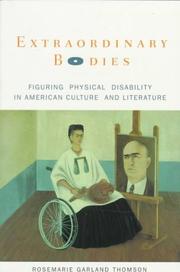
Overview
- Format
- Book
- Published
- New York : Columbia University Press, [1997]
©1997 - Locale
- United States
- Contents
-
The cultural work of American freak shows, 1835-1940. The spectacle of the extraordinary body
Constituting the average man
Identification and the longing for distinction
From freak to specimen : "The Hottentot Venus" and "The Ugliest Woman in the World"
The end of the prodigious body. Benevolent maternalism and the disabled women in Stowe, Davis, and Phelps. The maternal benefactress and her disabled sisters
The disabled figure as a call for justice : Harriet Beecher Stowe's Uncle Tom's cabin
Empowering the maternal benefactress
Benevolent maternalism's flight from the body
The female body as liability
Two opposing scripts of female embodiment : Rebecca Harding Davis's Life in the iron mills
The triumph of the beautiful, disembodied heroine : Elizabeth Stuart Phelps's The silent partner. Disabled women as powerful women in Petry, Morrison, and Lorde. Revising Black female subjectivity
The extraordinary woman as powerful woman : Ann Petry's The street
From the grotesque to the cyborg
The extraordinary body as the historicized body : Toni Morrison's disabled women
The extraordinary subject : Audre Lorde's Zami : a new spelling of my name
The poetics of particularity. - Notes
-
Includes bibliographical references (pages 173-189) and index.
The cultural work of American freak shows, 1835-1940. The spectacle of the extraordinary body -- Constituting the average man -- Identification and the longing for distinction -- From freak to specimen : "The Hottentot Venus" and "The Ugliest Woman in the World" -- The end of the prodigious body.
Benevolent maternalism and the disabled women in Stowe, Davis, and Phelps. The maternal benefactress and her disabled sisters -- The disabled figure as a call for justice : Harriet Beecher Stowe's Uncle Tom's cabin -- Empowering the maternal benefactress -- Benevolent maternalism's flight from the body -- The female body as liability -- Two opposing scripts of female embodiment : Rebecca Harding Davis's Life in the iron mills -- The triumph of the beautiful, disembodied heroine : Elizabeth Stuart Phelps's The silent partner.
Disabled women as powerful women in Petry, Morrison, and Lorde. Revising Black female subjectivity -- The extraordinary woman as powerful woman : Ann Petry's The street -- From the grotesque to the cyborg -- The extraordinary body as the historicized body : Toni Morrison's disabled women -- The extraordinary subject : Audre Lorde's Zami : a new spelling of my name -- The poetics of particularity.
Physical Details
- Language
- English
- ISBN
- 0231105169
0231105177 - Physical Description
- x, 200 pages : illustrations ; 24 cm
Keywords & Subjects
- Subjects
- American fiction--19th century--History and criticism. American fiction--20th century--History and criticism. People with disabilities in literature. Human body in literature. Human body--Social aspects. People with disabilities in literature--Social conditions. Women in literature. Popular culture--United States--History. Sideshows--United States--History. Feminism and literature--United States.
- Record last modified:
- 2024-06-21 14:38:00
- This page:
- https://collections.ushmm.org/search/catalog/bib31658
Additional Resources
Librarian ViewDownload & Licensing
- Terms of Use
- This record is not digitized and cannot be downloaded online.
In-Person Research
- Requires Research Visit
- Plan a Research Visit
- Check Nearby Libraries
-
Request in Shapell Center Reading Room
Bowie, MD



